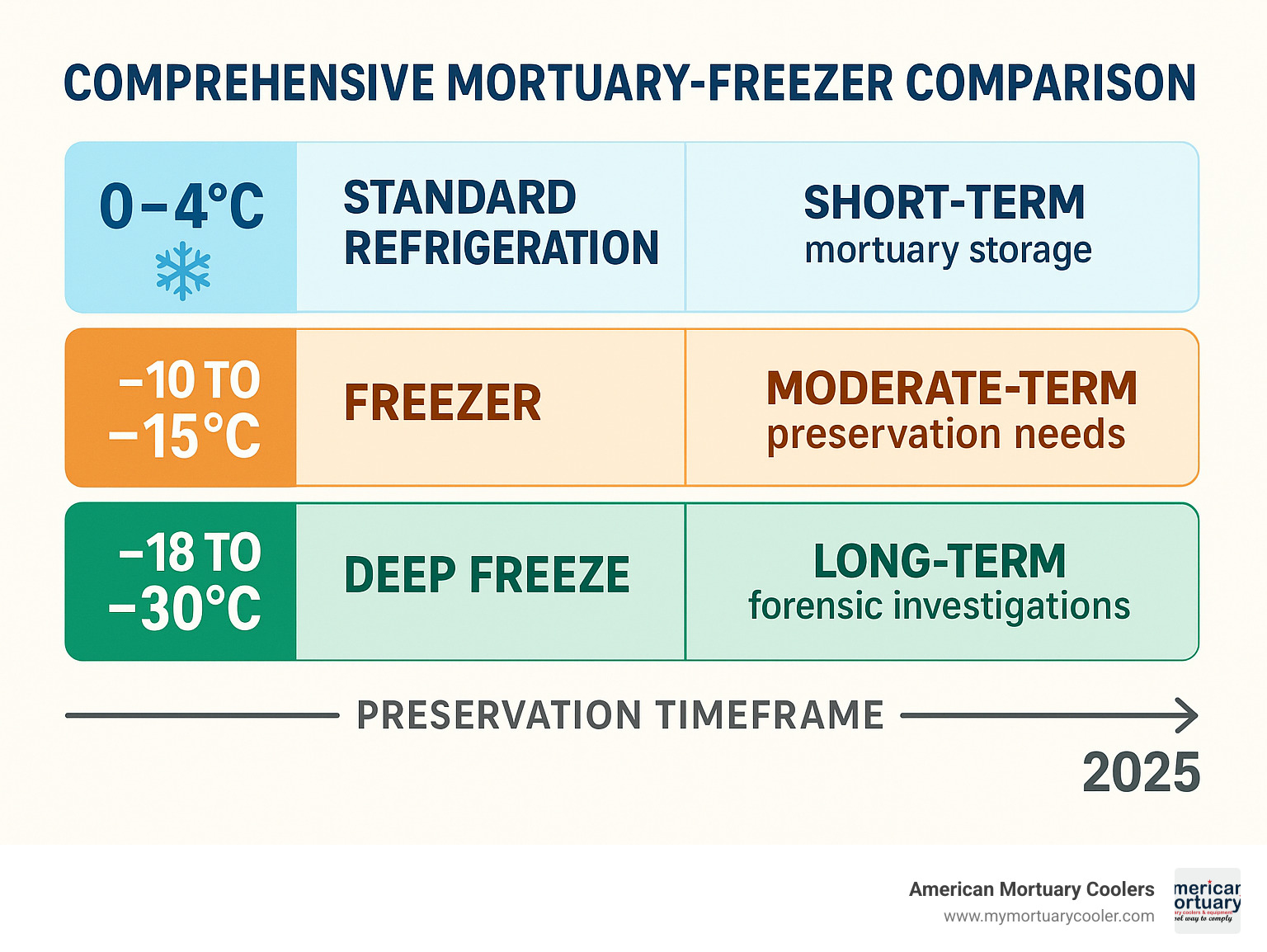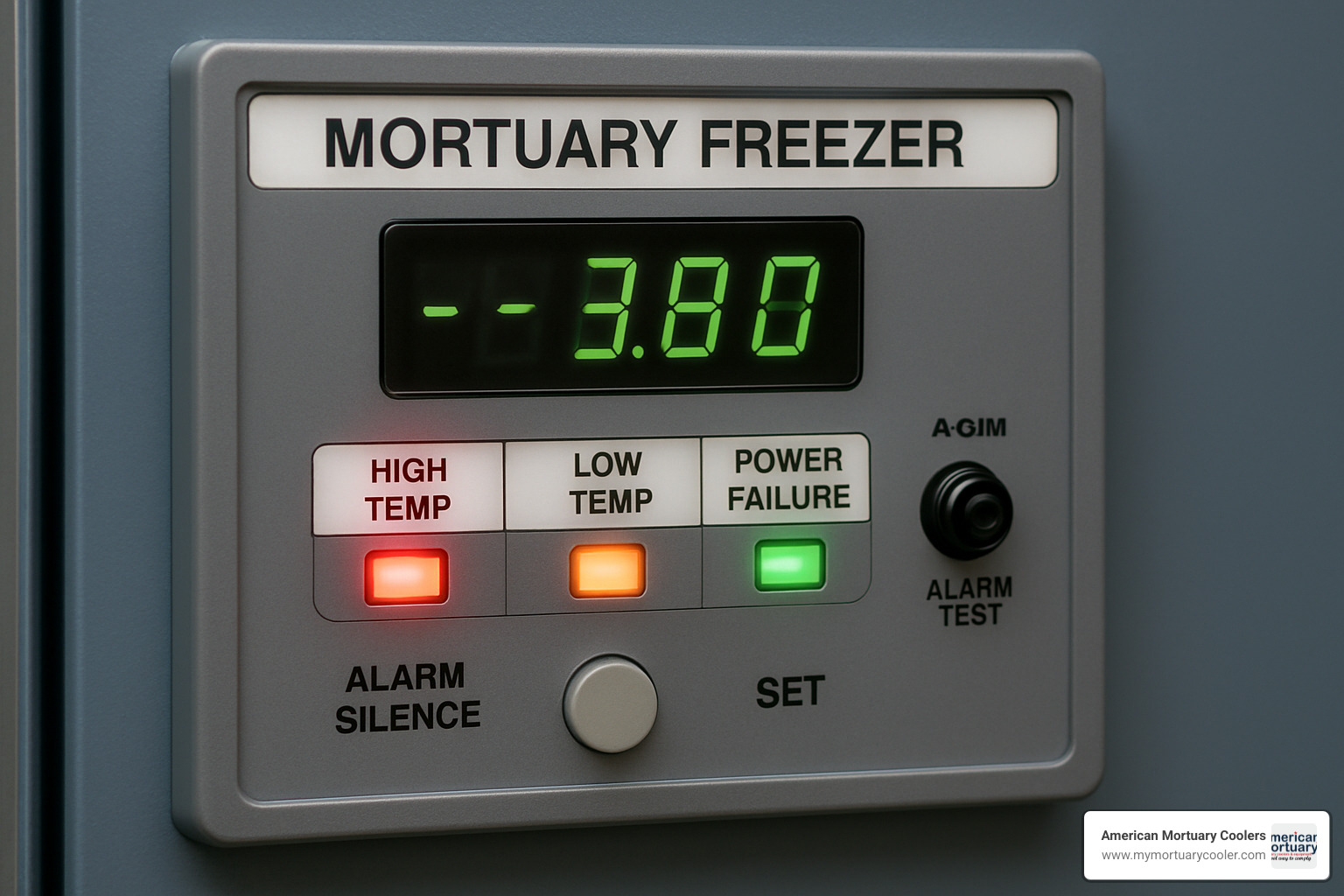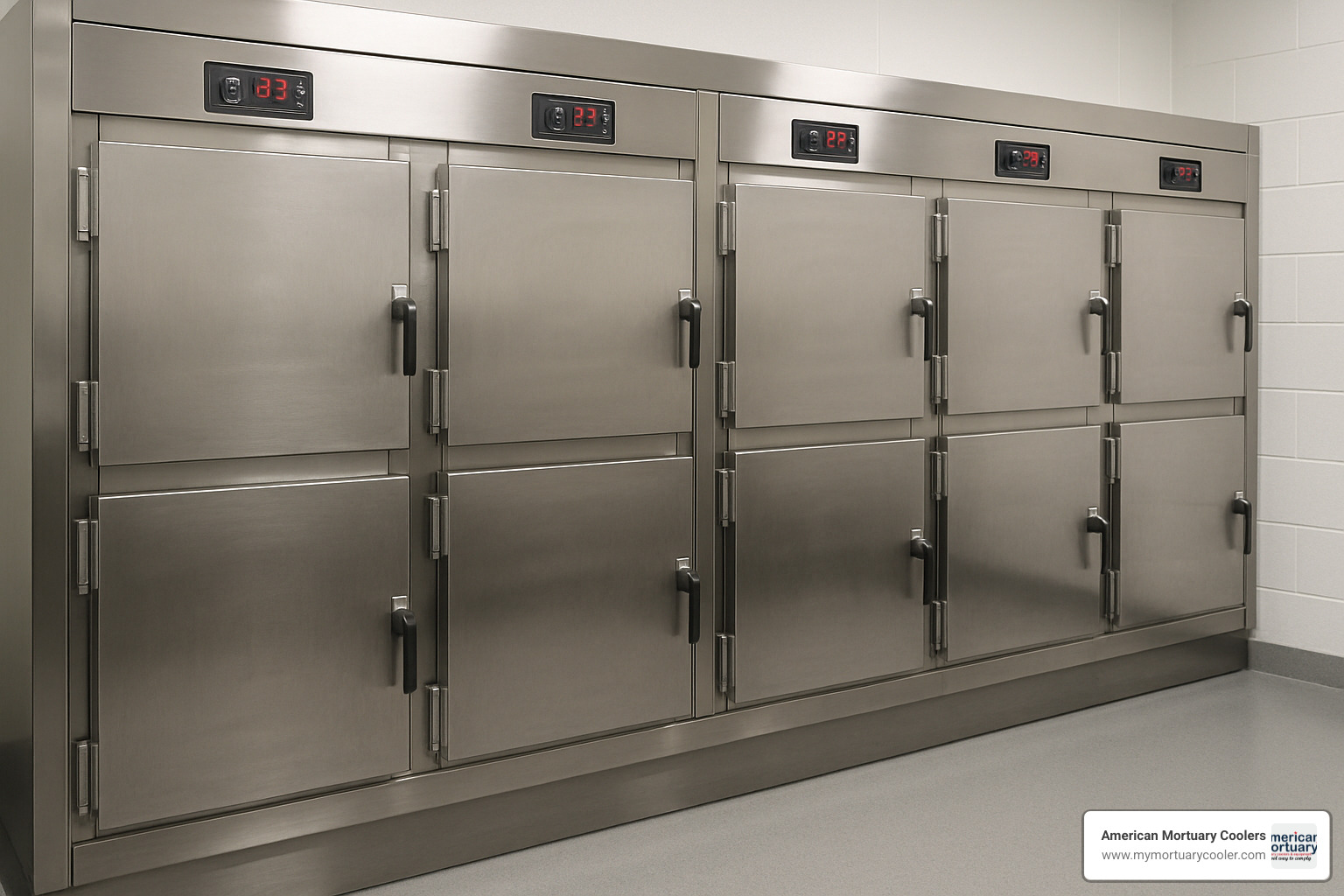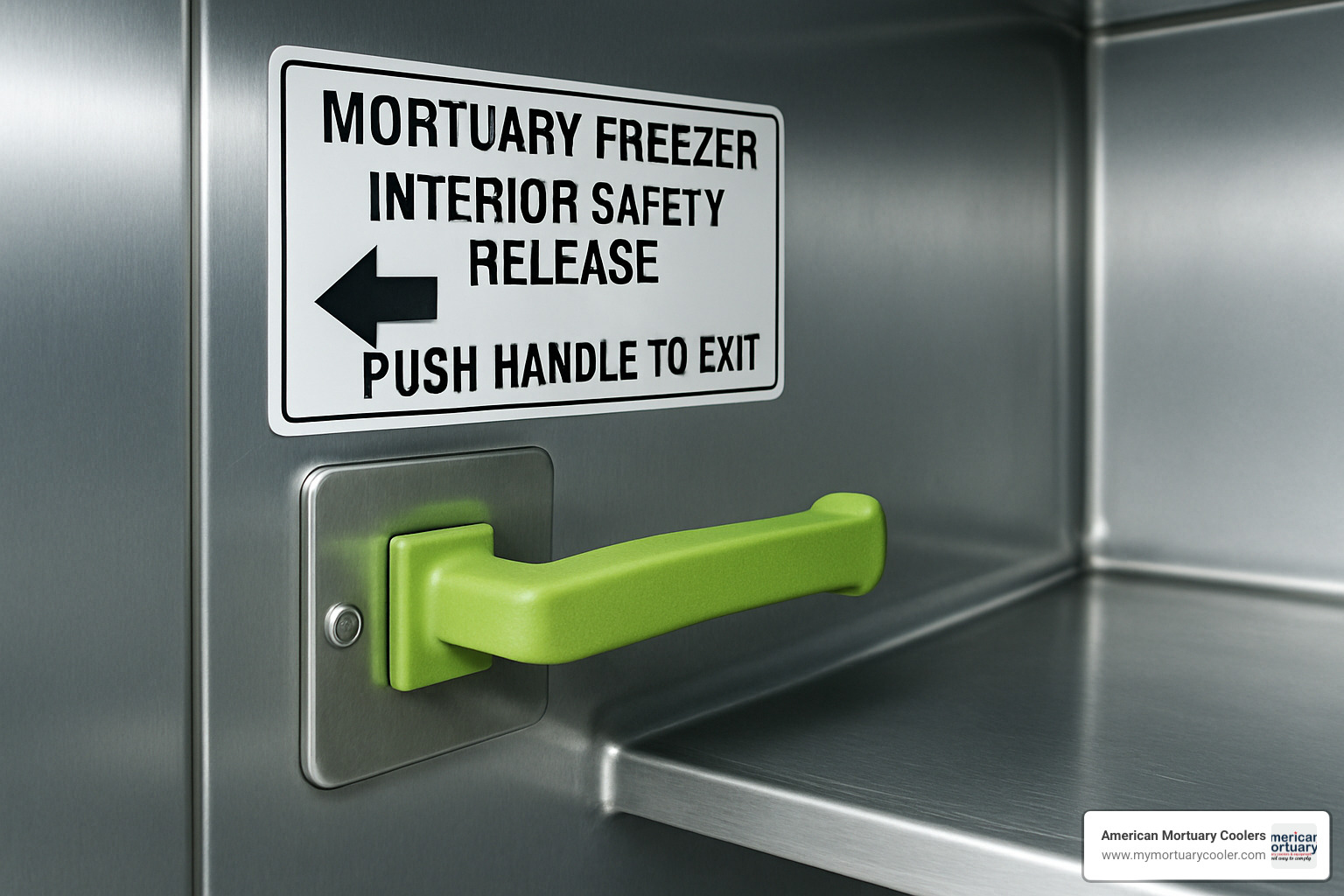
The Ultimate Guide to Mortuary Freezer Options
Why Mortuary-Freezer Technology Is Essential for Modern Funeral Homes
A mortuary-freezer is a specialized refrigeration unit designed to preserve human remains at sub-zero temperatures, typically between -18°C to -30°C, for extended storage periods. Unlike standard mortuary refrigerators that operate at 0°C to 4°C, mortuary freezers provide long-term preservation capabilities essential for forensic investigations, delayed funeral services, and respectful care of the deceased.
Key mortuary-freezer specifications:
- Temperature range: -18°C to -30°C (compared to 0°C-4°C for refrigerators)
- Capacity options: Single, double, triple, and multi-body configurations
- Construction: 304-grade stainless steel with 80-100mm polyurethane insulation
- Power requirements: 220-240V with backup alarm systems
- Safety features: Internal release handles, temperature monitoring, antimicrobial coatings
Modern mortuary freezers serve funeral homes, hospitals, and morgues by slowing decomposition far more effectively than standard refrigeration. This extended preservation window allows families adequate time for funeral planning while maintaining the dignity and condition of their loved ones.
Research shows that proper temperature control is critical - bodies stored at mortuary refrigerator temperatures (0°C-4°C) have limited preservation time, while freezer temperatures below -18°C can maintain remains for weeks or months when necessary. Each chamber typically supports 150-200 kg capacity with independent refrigeration systems for reliability.
As a national-level mortuary cooler supplier, I'm Mortuary Cooler, and I've helped hundreds of funeral homes select the right mortuary-freezer solutions for their specific needs and space constraints across the United States.

Basic mortuary-freezer vocab:
Understanding the Mortuary-Freezer: Purpose and Temperature Science
When you walk into a modern morgue, you'll notice something immediately - it's cold. Really cold. But there's actual science behind why mortuary-freezer units need to be so much colder than your kitchen refrigerator.
The magic happens when temperatures drop below -18°C. At this point, cellular fluids in human tissue begin forming ice crystals that essentially pause the decomposition process. It's like hitting a biological stop button.
Your standard mortuary refrigerator keeps things chilly at 0°C to 4°C, which slows decomposition but doesn't stop it. A mortuary-freezer, on the other hand, operates between -18°C to -30°C. At these temperatures, bacterial growth virtually halts and tissue breakdown becomes almost negligible.
Modern units achieve these frigid temperatures using R404A refrigerant systems with industrial-grade components designed for consistent, reliable operation. The thick polyurethane insulation (usually 80-100mm) wraps around each chamber, maintaining stable temperatures even when doors open frequently.
What Is a Mortuary-Freezer and Why Is It Colder Than a Refrigerator?
Think of a mortuary-freezer as the long-term storage solution when regular refrigeration isn't enough. While mortuary refrigerators work great for short-term storage (days), freezers handle situations requiring weeks or even months.
Here's where freezers become essential: forensic investigations that might take months to complete, mass casualty events where immediate processing isn't possible, and international repatriation cases with complex paperwork. Some families also have specific cultural or religious practices that require flexible timing for ceremonies.
Mortuary-Freezer Temperature Ranges & Standards
The -18°C benchmark isn't arbitrary. It's based on decades of preservation science and regulatory requirements from health departments. Many mortuary-freezer units can reach -30°C for specialized applications, but -18°C represents the sweet spot for most funeral home needs.
WHO guidelines recommend maintaining consistent sub-zero temperatures with accuracy within ±1°C. That level of precision requires sophisticated microprocessor controllers - not simple thermostats found in commercial freezers.
Independent compressors for each chamber provide crucial redundancy. When one system fails, other chambers keep running normally. We've seen too many situations where single compressor failure compromised entire facility storage capacity during critical times.
Mortuary-Freezer vs. Mortuary Refrigerator
When choosing between a mortuary-freezer and a mortuary refrigerator, you're deciding how long you need to preserve remains and what flexibility your facility requires. It's one of the most important equipment decisions affecting daily operations and energy costs.
The fundamental difference comes down to temperature and time. Mortuary refrigerators maintain temperatures between 0°C to 4°C, perfect for short-term storage of 3-7 days. A mortuary-freezer operates at -18°C to -30°C and can preserve remains for weeks or months when necessary.
| Feature | Mortuary Refrigerator | Mortuary-Freezer |
|---|---|---|
| Temperature Range | 0°C to 4°C | -18°C to -30°C |
| Storage Duration | 3-7 days typical | Weeks to months |
| Energy Consumption | 300-500W average | 400-600W average |
| Primary Use | Short-term preservation | Long-term storage |
| Cost | Lower initial cost | Higher initial investment |
| Maintenance | Standard refrigeration | Specialized freezer service |
Here's what matters: refrigeration slows decomposition, but freezing stops it almost completely. The Morgue Freezer vs Morgue Refrigerator: Essential Insights research shows this temperature difference creates dramatically different preservation capabilities.
Most facilities benefit from having both options available - refrigeration for day-to-day operations and freezer storage for special circumstances like forensic holds or when families need extra time.
Why Temperature Control Is Critical for Respectful Care
Temperature control isn't just about meeting regulations - it's about maintaining dignity and providing families with the time they need. When temperatures fluctuate or aren't properly maintained, tissue breakdown accelerates, compromising viewing opportunities and creating difficult situations for grieving families.
Regulatory mandates from the CDC and local health departments require specific temperature ranges and monitoring systems. These aren't just bureaucratic requirements - they're essential protections ensuring every family receives respectful care.
Alarm & Monitoring Features Every Unit Needs
Modern mortuary-freezer units come with sophisticated monitoring systems beyond simple temperature alerts. Audible alarms immediately alert staff to temperature deviations, while data loggers maintain continuous 24-hour temperature records for regulatory compliance.
Remote monitoring capabilities let you check equipment even when you're not at the facility. Door-ajar sensors prevent accidental temperature loss, and battery backup systems ensure alarms continue working during power outages.

Types & Configurations of Mortuary-Freezers
When it comes to mortuary-freezer options, one size doesn't fit all. I've worked with funeral homes needing just one compact unit and designed massive walk-in systems for busy metropolitan morgues. The variety of configurations means every facility can find equipment matching their specific needs.
Common setups include single-body units perfect for smaller funeral homes, double and triple-body cabinets for moderate-volume facilities, and multi-body systems handling 4, 6, or 8 bodies at once. We also build bariatric models, mobile trailer units, and walk-in cold rooms for high-capacity needs.

Fixed Cabinets & Walk-In Cold Rooms
Fixed mortuary cabinets are the workhorses of the funeral industry. These mortuary-freezer units feature 304-grade stainless steel construction with thick polyurethane foam insulation (80-100mm). This stainless steel resists corrosion and cleans easily, while thick insulation keeps temperatures steady even with frequent door opening.
The best units use seamless fiberglass construction eliminating cracks where bacteria hide. Many newer models have antimicrobial interior finishes that actively fight bacterial growth.
Walk-in cold rooms use modular panel construction with tongue-and-groove joints creating perfect insulation. Panels can be assembled, taken apart, and moved to new locations if facility needs change. Ceiling-mounted refrigeration units keep floors clear while providing powerful cooling.
Mobile & Transportable Mortuary-Freezers
Mobile mortuary-freezer units are lifesavers during emergencies and disasters. These trailer-mounted systems bring full mortuary capabilities wherever needed, running on standard electrical outlets or generator power when the grid fails.
Polar Leasing Need to rent a mortuary cooler or freezer? provides rental options for facilities dealing with equipment maintenance, unexpected capacity needs, or emergency situations.
Mobile units are built tough for transport with weather-resistant coatings and protective covers. The generator-ready capability is crucial when disasters strike, maintaining perfect temperature control during extended power outages.
Accommodating Bariatric & Oversize Cases
Modern funeral service sees more bariatric cases requiring specialized equipment. Standard mortuary equipment often can't safely handle individuals over 300 pounds or those with larger body dimensions.
Bariatric mortuary-freezer units feature extra-wide trays beyond standard 570mm width, reinforced construction supporting loads over 200 kg, and heavy-duty roller systems using silent nylon components. Adjustable height features make loading easier for staff, reducing injury risk during transfers.
Key Construction, Safety & Compliance Features
Building a mortuary-freezer that meets professional standards involves much more than just making it cold. These units need to protect both the people who work with them daily and maintain the dignity of those in their care.
Construction starts with seamless fiberglass eliminating every crack where bacteria might hide. Modern units feature antimicrobial coatings that actively fight pathogen growth. Safety features like internal release mechanisms prevent accidental entrapment, while LED lighting provides clear visibility.
Compliance requirements span NSF sanitation standards, EISA energy efficiency rules, UL electrical safety certification, and OSHA workplace safety standards.
Hygiene & Durability Materials
The materials in a mortuary-freezer make the difference between equipment lasting decades versus becoming a maintenance headache. We use 304-grade stainless steel throughout for corrosion resistance, easy cleaning, and structural strength.
This comprehensive approach includes brackets, fasteners, and internal components all in stainless steel, preventing hidden corrosion that could compromise structural integrity. Advanced surface treatments like SmartProtec® antimicrobial finish actively eliminate harmful bacteria on surfaces throughout the equipment's lifespan.
Safety Systems & Alarms in a Mortuary-Freezer
Modern mortuary-freezer units pack multiple safety system layers. High and low temperature alarms provide instant notification when something's wrong, while compressor delay circuits prevent expensive equipment damage during power fluctuations.
Battery backup systems keep alarm functionality running during power outages. Door safety features include internal release handles allowing exit from inside chambers - while this situation should never occur, the safety mechanism provides peace of mind.

Advanced units offer remote monitoring capabilities through network connections, letting you monitor critical parameters from anywhere for immediate response to equipment issues.
Regulatory Compliance Checklist for Morgues
Mortuary-freezer installations must satisfy multiple regulatory frameworks spanning federal, state, and local jurisdictions. Federal requirements include CDC guidelines, OSHA workplace safety standards, EPA refrigerant handling regulations, and DOE energy efficiency standards.
State and local requirements vary significantly by location, including health department mortuary licensing, building code compliance, fire safety requirements, and waste disposal protocols. Industry standards add another layer with UL-NSF panel approval, ASTM E84 flame spread testing, and ASHRAE refrigeration safety standards.
We maintain current knowledge of regulatory requirements across all regions where we operate, ensuring your installation meets applicable requirements without costly modifications later.
Selecting the Right Mortuary-Freezer for Your Facility
Choosing the perfect mortuary-freezer feels overwhelming initially, but breaking it into manageable pieces clarifies the process. I've walked hundreds of funeral directors through this decision, and the key is understanding your specific needs rather than picking the biggest or cheapest option.
Start by assessing your current capacity needs - how many bodies do you typically store simultaneously? Then consider growth projections. Available space often surprises people with its complexity. A 6-body cabinet sounds perfect until you realize your doorway won't accommodate delivery.
The Top 10 Mortuary Freezer Options guide breaks down popular models we install, comparing capacity to energy consumption without getting lost in technical specifications.
Energy Efficiency & Total Cost of Ownership
Many facilities make expensive mistakes focusing only on purchase price instead of total cost of ownership. A mortuary-freezer runs 24/7 for 15-20 years, so energy efficiency dramatically impacts your bottom line.
High-efficiency compressor technology makes the biggest difference in operating costs. Variable speed compressors adjust output based on cooling demand, while standard compressors run at full power or not at all. Insulation quality matters more than most realize - premium units use high-R-value panels keeping cold air in and warm air out.
Our lifecycle cost analysis typically shows premium efficiency units recover their additional cost within 3-5 years. Microprocessor controls optimize operation automatically, preventing energy waste from manual adjustments.
Installation, Service & Customization Tips
Successful mortuary-freezer installation starts with proper site preparation. Most units require dedicated 220-240V electrical circuits with varying amperage requirements between models. Modular panel construction in walk-in systems offers incredible flexibility for challenging installations.
Service accessibility becomes critical for long-term reliability. Your maintenance team needs clear access to compressor units, electrical panels, and refrigerant connections. Customization options let you tailor equipment to specific workflow, from interior configurations to exterior finishes matching your facility's aesthetics.
Complementary Equipment for Safe Handling
A mortuary-freezer works best as part of a complete system including proper handling equipment. Mortuary lifters reduce physical strain while improving safety during body transfers. Specialized trolleys designed for mortuary use make loading chambers much easier.
The Essential Safety Protocols for Morgue Freezers guide provides comprehensive guidance on safe handling procedures protecting both staff and families you serve.
At American Mortuary Coolers, we understand every facility has unique needs. Our Tennessee-based team works directly with you to design custom solutions fitting your space, budget, and operational requirements, with direct delivery across the contiguous 48 states.
Frequently Asked Questions about Mortuary-Freezers
How long can a body stay in a mortuary-freezer safely?
The beauty of a properly maintained mortuary-freezer is its ability to preserve remains for extended periods - weeks to months rather than days with standard refrigeration. The exact timeframe depends on key factors we see regularly in our work with funeral homes.
Temperature consistency is absolutely critical. When your freezer maintains steady -18°C to -30°C range, you're essentially hitting pause on decomposition. We've worked with forensic facilities where remains stayed preserved for months during complex investigations with excellent quality throughout.
The condition of remains when first placed in the mortuary-freezer also matters significantly. Bodies entering the freezer quickly after death in good condition preserve much better than those at room temperature for extended periods.
We always recommend checking with your local health department about specific time limits, as some jurisdictions have maximum storage periods regardless of preservation quality.
Can I convert an existing cool room into a mortuary-freezer?
This question comes up often from facilities looking to expand capacity without major investment. While technically possible to convert existing refrigeration into a mortuary-freezer, it's rarely the smart financial choice.
The challenge is achieving sub-zero temperatures requires completely different refrigeration systems than typically installed in cool rooms. You're looking at upgrading compressors, installing specialized controls, and adding alarm systems mortuary applications require.
Insulation becomes a major hurdle too. Most existing cool rooms lack high-density insulation and vapor barriers needed for efficient freezer operation. Retrofitting this insulation level often costs more than starting fresh with purpose-built units.
We've seen facilities attempt conversions and usually wish they'd gone with new mortuary-freezer from the start. The specialized safety features, hygienic construction, and regulatory compliance built into mortuary equipment are difficult to retrofit.
What maintenance does a mortuary-freezer require annually?
Keeping your mortuary-freezer running reliably isn't complicated but requires consistent attention. Daily and weekly tasks involve monitoring and basic cleaning - checking temperature logs, testing alarms periodically, and keeping interiors clean with approved sanitizers.
Monthly maintenance includes condenser coil cleaning and thorough inspections. Dirty condenser coils are probably the number one efficiency problem we see. Clean coils mean your compressor doesn't work as hard, saving energy and extending equipment life.
The annual service requires qualified technicians for complete refrigeration system inspection, electrical connection testing, and calibration verification. We strongly recommend service contracts with technicians understanding mortuary equipment - regulatory requirements and safety features differ from standard commercial refrigeration.
Well-maintained units from American Mortuary Coolers regularly operate effectively for 15-20 years with minimal major repairs.
Conclusion
Choosing the right mortuary-freezer isn't just about buying equipment - it's about investing in the dignity and respectful care that families deserve during their most difficult moments. From our experience helping funeral homes across the country, reliable preservation technology becomes the foundation of compassionate service.
The science is clear: sub-zero temperatures between -18°C and -30°C provide the preservation capabilities that modern funeral service demands. Whether dealing with forensic holds, international repatriation, or needing flexibility for family scheduling, a quality mortuary-freezer gives you the time and peace of mind to serve families properly.
Future-proof refrigeration means investing in equipment serving your facility for decades. The advanced monitoring systems, energy-efficient designs, and robust safety features represent real innovations reducing operating costs while improving reliability. These aren't just nice-to-have features - they're essential tools for professional mortuary operations.
Compliance and peace of mind go hand in hand. When your equipment meets CDC guidelines, includes proper alarm systems, and maintains detailed temperature logs, you're not just following regulations - you're protecting your reputation and providing the professional standard of care families expect.
At American Mortuary Coolers, we understand every facility has unique needs. The small rural funeral home serving three counties faces different challenges than the metropolitan morgue handling dozens of cases weekly. That's why we focus on custom solutions rather than one-size-fits-all approaches.
Our Tennessee-based team has delivered mortuary-freezers to facilities across all 48 contiguous states. Whether you need a compact single-body unit for backup capacity or a walk-in system for high-volume operations, we're here to help you make the right choice.
The funeral service industry continues evolving, but the fundamental need for respectful, dignified care remains constant. Quality mortuary-freezer technology supports that mission by providing reliable preservation when families need it most. Freeze Your: Ultimate Guide to Morgue Freezers and Fridges offers additional insights for facilities ready to explore their options.
We're proud to be part of an industry that serves families during their most challenging times. When you invest in professional mortuary refrigeration, you're investing in your ability to provide the compassionate, professional service that makes a difference in people's lives.



